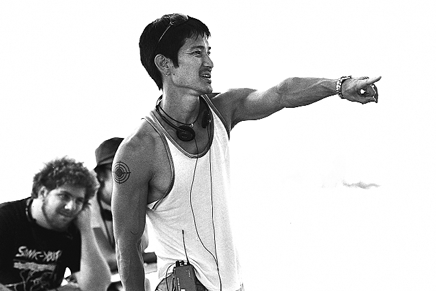An author and director discuss making the leap from page to screen
Opening right when the prosecution in the trial against Michael Jackson is about to rest its case, “Mysterious Skin,” Gregg Araki’s terrific new film based on the Scot Heim novel of the same name, may seem like a timely contribution to the current pedophilia scare, but it is unlikely that any of the people involved in its creation will be invited to appear on “Nancy Grace.”
The movie takes a more complex, multi-layered view to the issue of victimization of children, but at its core lies a more interesting phenomenon, namely the ability of memory to rewrite history, even personal history.
Heim published “Mysterious Skin,” his first novel, in 1995, right out of graduate school. Early on, he was commissioned to write a script based on the book himself, but failed.
“Gregg’s script is much closer to the original book than anything I could have come up with,” he said earlier this month during an interview in a SoHo hotel. “Even now when I see the film, I am not sure what parts of it are actually in the book. It has been so long that I sometimes feel that another person wrote it, which makes it a little easier watching the film. I can disassociate myself from the characters.”
The need to “disassociate from the characters” brings up the inevitable question. What parts of the story are autobiographical? Heim, who like his characters grew up in a small town in Kansas, said that there are aspects in both of the lead characters that he took from his own life.
“I did grow up in a small town,” he said. “At first, my parents were married and low-key and my mother held steady jobs and my home life was ordinary. Those years I put into the Brian character. And then my parents got divorced and my mom went crazy and started drinking and it was only me and her. Those years I put into the Neil character. But there are many things in the book that didn’t happen to me at all. I think that the genesis of many books, especially first novels, comes from personal experience but by the time you spend two years on a book, you are rewriting and revisiting characters and changing things, and so after a while it doesn’t resemble so much your own life.”
Which is, unsurprisingly, a way of not answering a question: Was he himself a victim of sexual abuse?
“All I can say is that there are things in the story that are taken from my own life,” Heim said, ‘but I didn’t fall in love with my coach and a lot of the early stuff in the book didn’t happen to me. In a way, I like to keep it a mystery. I found out that the more people think you write from experience, the less they value you as an artist, which is silly because writing a memoir is not an easy thing to do. It is like saying that writing a memoir is something that anyone can do.”
Araki, the director of critically acclaimed films, including “Splendor,” “Nowhere” and “The Doom Generation,” first came across Heim’s novel almost 10 years ago and found it, he said, “disturbing and powerful.” In spite of his initial feeling that the book was not adaptable, he devoted years to writing the script of “Mysterious Skin,” his first movie based on someone else’ material.
“I found it fascinating the way it opened the door on events and relationships that happen all the time, but are never talked about,” Araki said. “I didn’t want the film to turn its back on all those really unsettling moments which make the story so unique and ultimately so devastating.”
What Araki finds so refreshing—and many viewers might agree—is the fact that Heim gave one of the young men who survived child sexual abuse a rich and active sex life. Some may pathologize Neil, finding his promiscuity a way to act out, and perpetuate his childhood trauma. Still, there is no denying that Neil refuses to live as a passive victim, nor does he see the need to apologize for his insatiable sex drive.
“Neil is the gay character, and usually, people think of gay characters as confused victims, the kids that everybody bullies in the playground,” Heim said. “He is the opposite. He is the bully, he is the one who’s good in sports. He is still an outsider, but someone that other people, at least some of then, are fascinated by and afraid of.”
“The thing that struck me in the book is when Neil discovers issues of ‘Playgirl’ under his mom’s bed,” Araki said. “It was so powerful to me because I remembered doing that, seeing my first ‘Playgirl’ centerfold, a man naked. In my case, it was in a drug store. It is a moment when you are first developing sexual desire, sexual consciousness. Neil knows he is gay at a very young age, but even if he has desires it doesn’t mean that you, a grown man, should make him act upon them, it doesn’t mean that he is ready to have sex. That is the line that’s being crossed in the story.”
Perhaps the most disturbing, but ultimately rewarding aspect of “Mysterious Skin” is the suggestion that some people affectionately remember their childhood sexual encounters with grown men.
“This is the aspect the nobody wants to speak about,” said Araki, who’s hoping to get the opportunity to discuss the issue on television with Oprah Winfrey. “She herself was an abused child and one of the things she said was the ambivalence she felt about it. The same happens in the movie. You may enjoy it, but it still damages you.”
gaycitynews.com

































